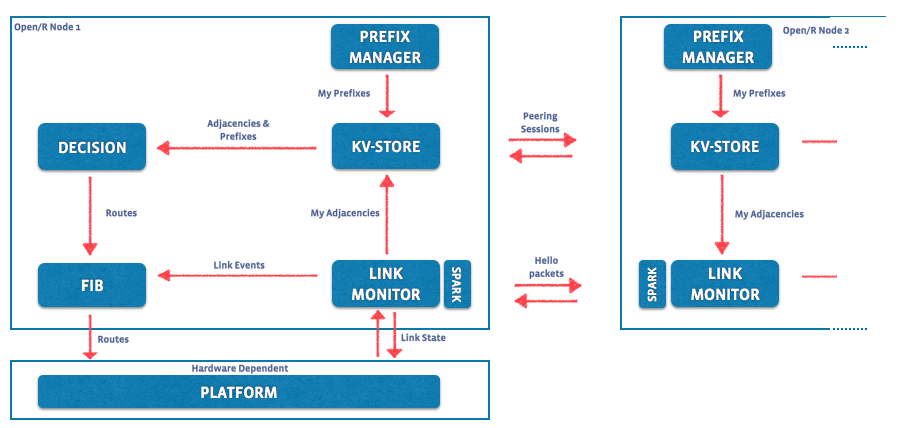Open Routing, OpenR, is Facebook's internally designed and developed routing
protocol/platform. Primarily built for performing routing in the Terragraph
network, it's awesome design and flexibility has led to its adoption in
Facebook's WAN Network, Express Backbone, as the sole IGP routing protocol.
It all started with the original goal of building a simple and extensible routing protocol for the Terragraph project and beyond.
Simplicity is understood in two dimensions:
- Maximum reuse of existing, well-tested components (boost graph lib, thrift2, ZMQ) for rapid development and code quality.
- Building on basic link-state routing principles and avoiding complex designs.
Extensibility
- quickly iterate on the basic model and incrementally add functionality such as segment-routing label distribution, or loop-free alternatives, etc.
Our primary protocol features are:
- Shared data-bus - to allow adding distributed apps on top of it
- Fast convergence - handling local failures in under 100ms timeframe
- Secure bootstrap - avoiding unwanted participants in network routing
- Address allocation - plug-and-play address allocation.
- HW/SW Segregation - easily integrate with different hardware
We plan to add more functionality in the future, and this is where the extensibility helps a lot. We are driven primarily by the idea of autonomic networking and the ability to innovate quickly.
Our intent is not building a new protocol, but rather provide a modular solution
to build distributed applications in the network of any kind (wireless mesh,
data-center, WAN). One of this applications happens to be the routing system. If
you look at OSPF or ISIS, they have the distributed message flooding store as
part of their design. However, this store is not being leveraged for any other
purposes, rather than optimize for distributing routing/link-state information
only, we decoupled the store and synchronize component of traditional IGPs into a
module of its own, and use this to add functionality in separate new modules -
e.g. a module for ECMP routing, loop-free alternate failover, bandwidth
allocation and so on. Effectively, our goal is to provide an underlying substrate
to quickly iterate in the field of distributed network applications, whereas
traditional routing protocols are rigid systems that are slow to extend. This
protocol could be then universally used across different types of networks,
and tuned appropriately. In addition, we are looking to build upon the concepts
of autonomic networking and make our networks easier to configure and manage.
The protocol implementation consists of the components depicted below:
KvStore- Key Value StoreLinkMonitor- Module to discover and monitor links on a given systemSpark- Neighbor discovery moduleDecision- Routes computation unitFib- Route programming unit, client interface
There are five modules interacting together: all five will run on every node in the network. We use ZMQ as the message transport bus, and Thrift for message encoding. Two of the modules (Store & Sync aka KvStore + Link Monitor's Spark) will be talking to the neighbors. Notice that unlike the traditional network protocols we do not focus on the wire format or interaction logic - rather, this is relegated to Thrift and ZMQ to deal with. Here is the high level of overview for each module and you can read more about other modules in it's own section.
The code is very modularized and each module is self-contained. For more information about each module please refer to documentation in header files of that module. The code is very well documented. This README gives you an overview of how different modules/libraries come together to build OpenR.
High-level overview of the documentation organization (alphabetically ordered)
Python click based CLI tool to interact with OpenR
Detailed overview about openr/decision module
Instructions on how to contribute to OpenR project and follow best
testing/coding practices.
Tool for generating/managing virtual mesh-network topologies for testing OpenR (at scale ... ~1000+ nodes topologies). Network topology can span across multiple servers.
Detailed overview about openr/fib module
Detailed overview about eventually replicated datastore, openr/kvstore and
it's operations as well as features.
Detailed overview about openr/link-monitor module
Miscellaneous notes and references e.g. various OpenR features like v4,
parallel links, drain and graceful restart, security concerns, marking control
plane packets and potential extensions.
A detailed overview of monitoring operations of OpenR. e.g. syslog, special event logs (structured) and counters.
Guide for integrating OpenR on a new platform and overview about openr/platform
codebase.
Managing prefix information in KvStore.
Documentation explaining in detail how to run and configure OpenR along with all supported configuration options
Neighbor discovery protocol of OpenR .... a simpler and extensible version
of the well-documented bfd protocol.
Open/R is evolving rapidly and we expect to add several features in the short term to handle network routing requirements. The current list of features we have on our mind is
- Encryption and authentication for control plane communication
- Segment Routing
- Emulation - Testing framework
- Weighted ECMP routing
Things move fast at Facebook which means our internal release cycle for a new
rollout of OpenR is on the order of weeks. You will see weekly tags (2017-11-15)
in the repository and we aim to maintain backward compatibility with 3 months in
the past. Prefer to pull the latest code and upgrade it into your network more
frequently to leverage the latest features.
In the future, our release plan might change and we might tag some stable releases, but until then we will just have weekly tags.
